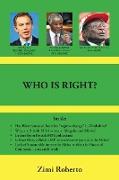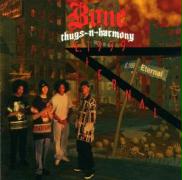- Start
- Who Is Right?
Who Is Right?
Angebote / Angebote:
The sovereign and independent African nation of Zimbabwe matters to all Africans who are compelled by Africa's history to continue the common struggle for the complete defeat of Western imperialism and neo-colonialism in the African continent (see appendix 3 on page 165 of this book). Hence, in essence, this book is about my individual indignation and worries with regard to the current British interventionist foreign policy towards Africa in general and British Labour's vicious and draconian measures towards the current elected Zimbabwean Government in particular. The book exposes and criticizes the venomous and bellicose Western imperialist language employed by Number 10 Downing Street and Westminster, aimed merely at fuelling social and political division among the well-known peaceful people of sovereign Zimbabwe - a masterminded, well-calculated division which can dramatically turn one group of Zimbabwean people against another in the sake of the British economic and strategic interests under menace in this African country. The book attempts to remind many people who still do not understand what has been happening between Anthony Charles Lynton Blair and President Robert Gabriel Mugabe, to critically look at the '1979 Lancaster House Agreement', the London constitutional arrangement that led Zimbabwe to its independence in 1980, and also ponder whether the following crucial statement made by the South African President Thabo Mvuyelwa Mbeki on the root causes of a longstanding bitterness land dispute between Britain and Zimbabwe has been true or false:"Britain and other Western countries had broken promises, dating from 1979, to fund peaceful land redistribution in Zimbabwe."Not a single British MP/politician from the three main political parties I wrote to since 2004 has been able to provide a straightforward answer to the above President's statement.The book also focuses on Mr Tony Blair's perversity to continue to fight against the principles of sovereignty and national self-determination of African people, principles set forth by the West itself to give nations the right to make their own decisions without interference from others.On the contentious relations between Westminster and Harare, I deliberately wrote to a total number of 50 British MPs. Although there are heavyweight, middleweight and lightweight MPs in the House of Commons, this book reveals serious contradictions on the interpretation of Ministerial and Constituency Commitments or Parliamentary Convention, a restriction which prevented some MPs from entering into correspondence with me on the issues I have raised with them (Refer to page 54 of this book). More interestingly, the book discloses the impact of my investigation on British MPs interests in Africa, which might have resulted to some frustrated MPs to press on 'DOD'S PARLIAMENTARY COMPANION' publisher to remove the request of 'countries of interest' from the biographies of all British MPs. Refer to page 88 of this book to see clearly the alterations made on the biographies of the 'quite man' Iain Duncan Smith, former Conservative leader who led his party very briefly and Frank Dobson, Labour MP(read Dobson's replying letter to me on page 68 of this book).Finally, as the author, I would like to emphasize that although some of the materials contained in this book may assist scholars in one way or another, however, this is a book with a core purpose to raise public awareness on the current issues regarding British foreign policy towards Africa - a book which I have chosen to write some parts of it in basic English to meet the reading and understanding needs of different backgrounds of readers. It means that the book is much more aimed at a wide general public rather than at the academic community in the normal sense.
Folgt in ca. 10 Arbeitstagen




